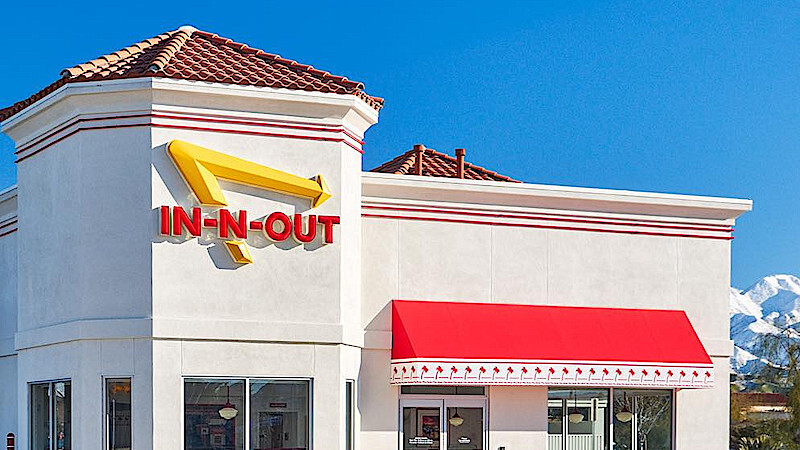Attorneys representing groups of In-N-Out workers will get a chance grab a piece of the action for themselves in lawsuits accusing the quintessential California fast food chain of violating California labor law by requiring workers to pay for their own white work pants, after a state appeals panel says a lower court judge wrongly refused their attempt to stop a third worker from sealing a deal that may have ended other similar cases.
On Aug. 29, a three-justice panel of the California First District Appellate Court tossed out a ruling from Sonoma County Superior Court Judge Jennifer V. Dollard that had favored In-N-Out and plaintiff Ryan Accurso in the dispute over the fate of In-N-Out’s efforts to settle Accurso’s case and potentially all others like it.
Since 2019, six different lawsuits have been filed against In-N-Out by workers in four California counties, each accusing the iconic hamburger chain of improperly refusing to reimburse workers for the cost of purchasing and cleaning white work pants the company requires employees to wear as part of their work uniforms.
The lawsuits assert this violates California labor law.
The lawsuits were brought as so-called representative actions on behalf of all other affected workers under California’s Private Attorneys General Act (PAGA.)
According to the narrative in the appellate decision, Accurso was among the latest to file suit, bringing his complaint in Sonoma County in 2021. At that point, other plaintiffs had already filed their own PAGA representative actions, including plaintiffs Tom Piplack in Orange County and Brianna Marie Taylor in Los Angeles County.
At some point, Accurso agreed to take his case to mediation. That then prompted attorneys for Piplack, Taylor and three other plaintiffs to attempt to negotiate an agreement to allow for the cases to all be settled together.
However, the appellate justices said those talks broke down when the plaintiffs’ various lawyers could not agree on how much they should all be paid under such a deal.
After that, Accurso continued to move forward to settle with In-N-0ut, without the other plaintiffs. According to the appellate decision, In-N-Out may have agreed to pay $2.05 million to “resolve all the PAGA claims … with a release that would ‘wipe out’ all PAGA claims against In-N-Out.”
With such a settlement imminent, attorneys for Piplack and Taylor moved to intervene in the case, to preserve their stakes.
That intervention, however, was rejected by Judge Dollard, who ruled the other plaintiffs lacked standing in Accurso’s case, because under the PAGA law, the plaintiffs are essentially suing in place of the state of California, to enforce labor law, and not in their own personal interest over a personal injury.
On appeal, however, the First District court justices said Dollard got the law wrong and should have allowed Piplack and Taylor to intervene.
The justices centered their decision on the legal doctrine known as exclusive concurrent jurisdiction. In their motions, Piplack and Taylor argued that doctrine should mean Accurso’s case should be put on hold, because their lawsuits were filed first in other counties.
The justices said Dollard was wrong to block Piplack and Taylor from presenting that argument.
The justices also rejected an attempt by Accurso to wall off Piplack and Taylor, by pointing out the two had only sought to intervene after they had failed “to obtain a strong-arm consensus among six different law firms” over a settlement and attorney fees.
The justices, however, said the motion to intervene arrived shortly after the other plaintiffs allegedly learned of the imminent settlement that could have ended their own claims.
In the decision, the justices said they are not ordering any court to take any action related to the motion to intervene or in determining how to run the case going forward. Rather, they said in this instance, the judge erred in blocking Piplack and Taylor from attempting to preserve their own claims as the cases moved toward settlement.
They also encouraged judges to work collaboratively to move the cases toward a conclusion, saying under exclusive concurrent jurisdiction the issues in the cases “may be resolved in any number of ways designed to maximize efficiency, while at the same time allowing all PAGA claimants … to participate in litigation in which they have an interest…”
The decision was authored by Justice Jon B. Streeter. Justices Tracie L. Brown and Jeremy Goldman concurred.
Piplack and Taylor have been represented by attorneys Randall B. Aiman-Smith, Reed W.L. Marcy, Hallie von Rock and Brent A. Robinson, of the firm of Aiman-Smith & Marcy, of Oakland; Joseph Lavi, Jordan D. Bello and Vincent G. Granberry, of the firm of Lavi & Ebrahimian, of Beverly Hills; and attorney Sahag Majarian II, of Tarzana.
Accurso has been represented by attorneys Jonathan M. Lebe, Zachary T. Gershman and Brielle D. Edborg, of Lebe Law, of Los Angeles.
In-N-Out has been represented by attorneys Paul S. Cowie, John D. Ellis, Sami Hasan and Amanda E. Beckwith, of the firm of Sheppard Mullin Richter & Hampton, of San Francisco.
